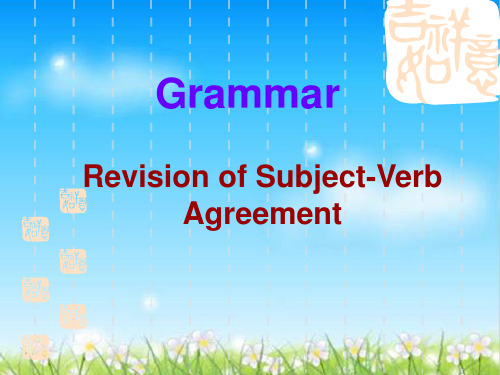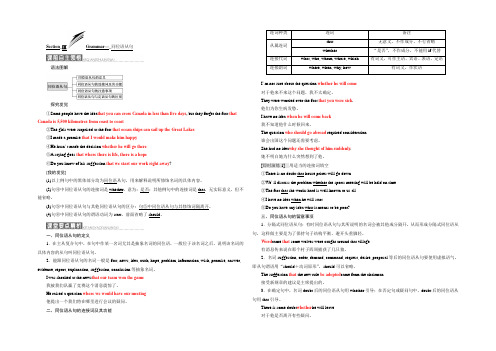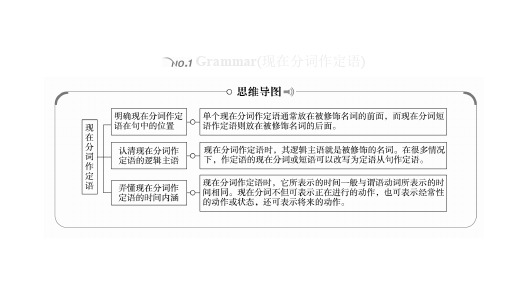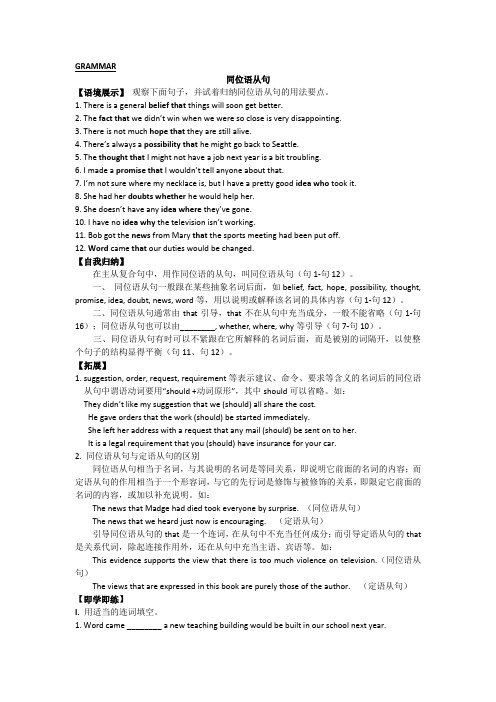人教版高中英语必修三unit5Grammar
- 格式:pptx
- 大小:467.69 KB
- 文档页数:29

Unit 5 The Value of MoneyPeriod 3 Discovering Useful Structures情态动词和过去将来时态(导学案)This teaching period is about expressing modality and talking about future events in the past. Modality reflects the feelings of the person who is talking. It is still a really big challenge for senior students to master the usages of the modal words. Generally, in this unit, we will review and further learn the following model words, would/had better/ ought to/dare/should etc.As for the structures about the future events, we should lead students to master would be/do; was /were going to do/be about to do.1. Guide students to review the basic usages of “modality” and talk about future events in the past.2. Enable students to use the related grammar structures flexibly.3. Strengthen students’ great interest in grammar learning.1. Help students to appreciate the function of “modality”and the meanings of the structures “was (were) about to/was (were) going to do/was (were) going”2. Instruct students to write essays using the proper “modality”and past future tenses.指出下列句中画线部分的含义1.That is why Letters from Father Christmas could be the perfect book.2.The children must have been very excited as they opened it.3.They might not receive their presents if they were not good.4.I was able to hold a knife and fork—and chopsticks!5.But there are still some dishes that Dad dare not try even after many years of marriage to my mother.6.Mum and I just have to find a way to get him into the kitchen!7.we'd better not eat too much roast food as it may make us suffer from heat inside our bodies, ...8.“You needn't try it if you don't want to,” Mum said.【答案】:1.能够 2.一定;准是 3.可能 4.能够 5.胆敢,敢于 6.不得不7.最好8.不必一、情态动词can与could的用法1.表示能力:can用来表示现在的能力,could表示过去的能力。


Section_ⅢGrammar—_同位语从句语法图解探究发觉①Some people have the idea that you can cross Canada in less than five days, but they forget the fact that Canada is 5,500 kilometres from coast to coast.②The girls were surprised at the fact that ocean ships can sail up the Great Lakes.③I made a promise that I would make him happy.④He hasn't made the decision whether he will go there.⑤A saying goes that where there is life, there is a hope.⑥Do you know of his suggestion that we start our work right away?[我的发觉](1)以上例句中的黑体部分均为同位语从句,用来解释说明所修饰名词的具体内容。
(2)句④中同位语从句的连接词是whether,意为:是否;其他例句中的连接词是that,无实际意义,但不能省略。
(3)句⑤中同位语从句与其他同位语从句的区分:句⑤中同位语从句与其修饰词隔离开。
(4)句⑥中同位语从句的谓语动词为start,前面省略了should。
一、同位语从句的定义1.在主从复合句中,在句中作某一名词尤其是抽象名词的同位语,一般位于该名词之后,说明该名词的具体内容的从句叫同位语从句。
2.能跟同位语从句的名词一般是fact, news, idea, truth, hope, problem, information, wish, promise, answer, evidence, report, explanation, suggestion, conclusion等抽象名词。



GRAMMAR同位语从句【语境展示】观察下面句子,并试着归纳同位语从句的用法要点。
1. There is a general belief that things will soon get better.2. The fact that we didn’t win when we were so close is very disappointing.3. There is not much hope that they are still alive.4. There’s alw ays a possibility that he might go back to Seattle.5. The thought that I might not have a job next year is a bit troubling.6. I made a promise that I wouldn’t tell anyone about that.7. I’m not sure where my necklace is, but I have a pretty good idea who took it.8. She had her doubts whether he would help her.9. She doesn’t have any idea where they’ve gone.10. I have no idea why the television isn’t working.11. Bob got the news from Mary that the sports meeting had been put off.12. Word came that our duties would be changed.【自我归纳】在主从复合句中,用作同位语的从句,叫同位语从句(句1-句12)。
Unit 5The power of nature主题语境:人与自然——灾害防范SectionⅢ—Grammar课后篇巩固提升一、变式训练1.Because I was tired,I stopped to have a rest.=,I stopped to have a rest.2.Because I had experienced a few earthquakes before,I wasn’t frightened.= a few earthquakes before,I wasn’t frightened.3.If you turn to the right,you will find a path leading to his cottage.=,you will find a path leading to his cottage.4.Because I had spent all night watching the game,I was very tired the next day. =all night watching the game,I was very tired the next day.5.As I came out of my house,I saw my father planting trees in the garden.= my house,I saw my father planting trees in the garden.二、根据汉语意思,用动词-ing形式(短语)完成如下句子1.由于生病,我不得不待在家里。
,I had to stay at home.2.他把咖啡杯掉在了地上,摔得粉碎。
He dropped the coffee cup to the ground, .3.过马路的时候要小心些。
When ,please be careful.4.听到这个消息我们都高兴地跳了起来。
Unit 5 The value of money单元内容分析本单元主题:人与社会-金钱的价值单元内容分析本单元的主题是“金钱的价值”(The Value of Money),首先用一则清洁工拾金不昧的新闻报道引发讨论,主体部分是根据美国作家马克·吐温的短篇小说《百万英镑》和同名电影改编的戏剧剧本。
作者用略带夸张的手法勾勒出不同人物在“百万英镑”面前的种种丑态,令人忍俊不禁。
该作品揭露了资本主义社会金钱至上的残酷现实,能启发学生深人思考金钱的价值,树立正确的价值观。
以下为教材各部分教学内容简要分析及教学活动实施建议:1.Opening Page 主题图呈现的是《百万英镑》电影中发生在酒店的一幕。
在这幅剧照中,主人公亨利高高举起刚刚找到的百万英镑大钞给债主们看,剧照上面的背景就是这张在故事发展中起重要作用的巨额钞票。
本页还提供了英国哲学家弗朗西斯·培根的名言“Money is a good servant and a bad master.”(金钱是善仆,也是恶主。
)这句话揭示了金钱的两重性:善用金钱,它可以为我们服务;当我们被金钱所迷惑,就会沦为它的奴隶。
当今社会拜金主义现象依然存在,探讨对待金钱的正确态度,培养学生树立健康的金钱观,这便是本单元的主题意义所在。
2.Listening and Speaking:Discuss the good deed of returning lost money 该板块的活动主题是“讨论拾金不昧的善举”。
通过一则“清洁工拾金不昧”的新闻报道开启本单元关于“金钱的价值”的主要讨论,为后面探究《百万英镑》戏剧的主题意义做铺垫。
另一方面,新闻体裁的引入也体现了语言学习的实用性。
该板块旨在帮助学生熟悉新闻报道的文体特点,培养听英语新闻的技能。
新闻报道的基本文体特征是内容广泛、时效性强,简洁明了、生动鲜明。
该听力文本符合“新闻导语法”的结构特点。
第一段导语包含的核心信息有:主人公的名字(Chen Liyan)、该事件的影响(has made the headlines)、撰稿人的态度(generous and honestact)。
Section Ⅲ Grammar—省略语法图解探究发现1.(You) Come in, please!2.John is a lawyer, and his wife (is) a cleaner.3. a.First degree burns turn white when (they are)pressed.b.If burns are on arms or legs, keep them higher than the heart, if (it is) possible.4. a.He is the man(who/whom/that) you can depend on.b.There is no doubt that John’s quick thinking and the first aid skills (that/which) he learned at school saved Ms Slade’s life.5.The boy wanted to play football in the street, but his mother did not allow him to (play football in the street).6. It shows (that) a knowledge of first aid can make a real difference.[我的发现](1)例句1为简单句中的省略。
(2)例句2为并列句中的省略。
(3)第1组例句为状语从句的省略。
当状语从句的主语和主句的主语指的是同一人或物,且由人称代词的主格担当,或当状语从句的主语为it,而且从句谓语中含有be动词时,可以把从句的主语和be动词一起省略。
(4)第2组例句为关系代词的省略。
当关系代词在限制性定语从句中作宾语时可以省略。
(5)例句5为不定式的省略。
有时可用不定式符号“to”来替代上文中出现的不定式。